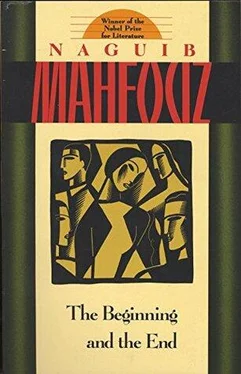Naguib Mahfouz - The Beginning and the End
Здесь есть возможность читать онлайн «Naguib Mahfouz - The Beginning and the End» весь текст электронной книги совершенно бесплатно (целиком полную версию без сокращений). В некоторых случаях можно слушать аудио, скачать через торрент в формате fb2 и присутствует краткое содержание. Год выпуска: 2016, Издательство: Anchor Books, Жанр: Классическая проза, на английском языке. Описание произведения, (предисловие) а так же отзывы посетителей доступны на портале библиотеки ЛибКат.
- Название:The Beginning and the End
- Автор:
- Издательство:Anchor Books
- Жанр:
- Год:2016
- ISBN:нет данных
- Рейтинг книги:4 / 5. Голосов: 1
-
Избранное:Добавить в избранное
- Отзывы:
-
Ваша оценка:
- 80
- 1
- 2
- 3
- 4
- 5
The Beginning and the End: краткое содержание, описание и аннотация
Предлагаем к чтению аннотацию, описание, краткое содержание или предисловие (зависит от того, что написал сам автор книги «The Beginning and the End»). Если вы не нашли необходимую информацию о книге — напишите в комментариях, мы постараемся отыскать её.
The Beginning and the End — читать онлайн бесплатно полную книгу (весь текст) целиком
Ниже представлен текст книги, разбитый по страницам. Система сохранения места последней прочитанной страницы, позволяет с удобством читать онлайн бесплатно книгу «The Beginning and the End», без необходимости каждый раз заново искать на чём Вы остановились. Поставьте закладку, и сможете в любой момент перейти на страницу, на которой закончили чтение.
Интервал:
Закладка:
The captain fell into deep silence, then gently expressed his sorrow. After several speechless moments, he inquired, “Need this really mean that the club should be deprived of two skillful members like you?”
“Mourning dictates it,” Hussein quickly replied.
“Mourning is not incompatible with sports,” said the captain with compassion.
“Our circumstances warrant this. I’m sorry,” said Hussein amiably.
He made his farewells and walked away, avoiding his eyes. Joining his friends, he found them discussing politics. One was saying, “God be merciful to the martyrs of the Faculties of Art, Agriculture, and Dar el-Ulum!”
“Sacrifices must be made,” said another, “for blood is the only language the British understand.”
“The pure blood of the martyrs has never been shed in vain.”
“Don’t you hear the call for unity now?” said a third.
“And here is The Times hinting at negotiations.”
The bell rang and, still arguing, they went to their classes.
TEN
Carrying their books, they silently crossed the courtyard of the house. “The Shubra Club football team will soon be starting its training for the next match!” said Hassanein as they went upstairs. Hussein did not answer. He kept imagining the playground and the players, and he mentally heard the voice of the captain telling the others of their withdrawal from the team “on account of the recent family circumstances.” There would be no play, no joy, and no escape from Hassanein’s continuous complaints. They knocked and were let in. Inside they stopped in astonishment at the strange, unexpected sight that met their eyes. They saw all the furniture of the house piled into the hall in complete disorder, the chairs on the sofa, the carpets rolled up, and the wardrobes undone. There stood Samira and Nefisa, their sleeves rolled up, covered with dust and sweating in spite of the mild weather.
“What’s the matter?” cried Hassanein.
“We are leaving this flat,” their mother answered.
“But where to?”
“Downstairs. We shall exchange flats with the landlady.”
A ground-floor flat, on the same level with the dusty courtyard and with no balconies! Its windows, which overlooked a side blind alley, all but exposed the rooms to the people passing by; no sunlight, no fresh air.
“But why?” asked Hassanein discontentedly, although he had already guessed the answer.
“Because the rent is only one pound and fifty piasters,” their mother replied in a clear voice.
“The difference in the rent is less than fifty piasters. It doesn’t match the difference between the two flats!” the young man complained.
“Would you undertake to pay that little difference?” the mother asked indignantly.
“Why, then, did we allow Nefisa to become a dressmaker?”
His mother gave him a fiery look. “So that we can eat!” she cried. “To keep you from dying of hunger!”
Trying to keep his face pleasant and not show any resentment, Hussein asked his mother, without a trace of objection, “When did all this take place, Mother?”
“I suggested it to the landlady, and did not hide anything from her,” the woman replied as she wiped her forehead with the sleeve of her black dress. “She was good enough to agree without hesitation.”
“If she were really good, she would let us stay in our flat without asking for the difference in the rent!” Hassanein grumbled.
“People have other things to attend to than your welfare!” His mother answered sharply.
“How are we going to sleep tonight?”
In a downcast voice, which indicated that she had not yet recovered from the shock of her father’s death, Nefisa answered, “We shall sleep in the new flat.”
At that moment Hassan emerged from his dead father’s bedroom carrying the peg, the last piece of furniture. “Stop bickering,” he said quickly, “and let’s take the furniture downstairs. We have only two hours before dark.”
Wishing them to follow his lead, he lifted one side of a sofa, saying to his brother Hussein, “Lift the other end.”
Nefisa opened the door wide, and the two brothers passed through with their load. Going carefully downstairs, Hussein wondered if anyone in the family of their good neighbor Farid Effendi Mohammed, who lived on the third floor, would see them.
Separation, he thought, is not the worst part of death. It is only secure people who experience sadness on account of their separation from the ones they have lost. But as for us, our troubles succeed one another so fast that they leave us no time to be sad. How our condition deteriorates! But we have to be patient or at least to pretend that we are. The worst thing we can do is increase, through our anxiety, the misery of our mother. I shall speak more firmly to Hassanein! Their mother and sister followed with whatever pieces they could carry. Hassanein could not bear to stand there as a spectator, so he joined them. The members of the family climbed up and down the stairs, moving in. The landlady had emptied her flat and all her furniture was lying in the courtyard. Her porters were standing nearby awaiting their turn to start working. All the members of the family, whether or not they showed their emotions, shared the same feelings of sorrow and pain. Samira’s face was not easy to decipher, but Nefisa’s eyes were filled with tears. Hassan was working hard as if to ingratiate himself with his mother through his labor, lest she criticize him for his idleness. Being used to a vagabond’s life, it was natural that, of the three brothers, he should be the least affected by the radical change that had been visited upon the family. Panting with exertion, Hassanein whispered to Hussein, “Don’t you see that we will never make up for the loss of our father?” Two tears rolled down his cheeks.
ELEVEN
Hassan left early in the morning immediately after his brothers’ departure for school. There was no need for him to go out so early, but he wanted to avoid friction with his mother so as to spare her a quarrel which, in her grim and unfortunate circumstances, she could very well do without. He left Nasr Allah behind, and walked on aimlessly and hopelessly. “Find yourself a job.” That’s what she is telling me all the time. Where am I to find that job? As an apprentice in a grocery? But that will end in a quarrel, an ambulance, and the police. Yet, he did not feel as hopeless as he should have. He was too self-confident and optimistic for that. He could not, however, ignore his precarious position and he kept talking to himself: Your father (God be merciful to him) is dead now. You’ve lost your shelter. True, you’ve always made your living through quarrels and rows, and you had to put up with insults and abuse, but, anyhow, that was a sure living. Even this suit you’re wearing, which makes you look not too bad an Effendi, comes with his money. Yes, at first he refused to buy it for you, but you threatened him that you would walk along the streets in your underwear, and burst almost naked into the palace of Ahmad Bey Yousri, where he usually spent his time, and so he gave in and instructed the tailor to make this suit. Now, if you go around completely naked, nobody will mind except the police!
The suit was nice, though slightly stained at the knees. He put on a bow tie, which showed off his dilapidated shirt. His hair was the most peculiar feature of his appearance, for he had let it grow so long, thick, and frizzy that it looked almost like a second head set upon his real one. His face was as handsome as the faces of his brothers, and besides, his body was tall and muscular with broad bones. He went on his way with these thoughts until suddenly he regained his self-confidence and said to himself: Don’t worry; only fools worry. You will live long and experience life, be it sweet or bitter. I’ve never heard of any man who died of hunger. There is always plenty of food, and you’re not greedy; all that you need are some morsels of bread, clothing, a few glasses of cognac, some hashish to smoke, and a few women to sleep with. And all these are available in more abundance than one can ever conceive of. Well, my boy, depend on God and stop worrying. He wasn’t penniless, for he had managed his father’s funeral and in the process garnered forty piasters which no one knew about. He wondered whether to give the money to his mother. Oh no! Mother will not make much use of it, whereas there is no doubt that losing this money would be a great setback to me. I don’t know when I shall ever find so much money again. With his sharp eyes, he saw the Al Gamal café and he hurried to reach it. It was a café of no distinction, but it overlooked the street. At that early hour, there were only two people there, sitting at a table placed on the pavement, basking in the sun and drinking coffee. Inside, in a corner, sat three youths whose appearance and bemused looks indicated idleness and desperation. It was not strange, then, that the young man should walk up to them and join their group. Presently, one of them asked for a pack of cards, and they all got ready to play. Each one of them hoped to win his bread for the day from his friends; five piasters would be more than enough. Hassan was often the winner, for he was clever at cards and quick with his hands and eyes. Thus before they started to deal, one of them said, “No cheating.”
Читать дальшеИнтервал:
Закладка:
Похожие книги на «The Beginning and the End»
Представляем Вашему вниманию похожие книги на «The Beginning and the End» списком для выбора. Мы отобрали схожую по названию и смыслу литературу в надежде предоставить читателям больше вариантов отыскать новые, интересные, ещё непрочитанные произведения.
Обсуждение, отзывы о книге «The Beginning and the End» и просто собственные мнения читателей. Оставьте ваши комментарии, напишите, что Вы думаете о произведении, его смысле или главных героях. Укажите что конкретно понравилось, а что нет, и почему Вы так считаете.












